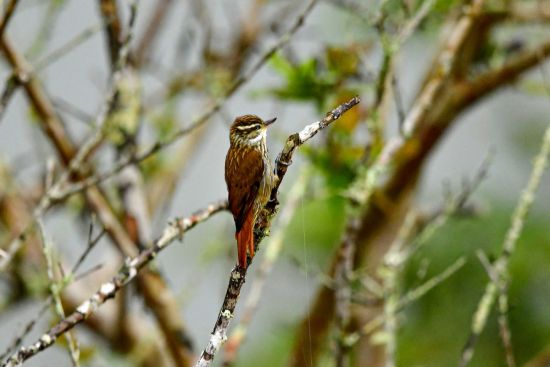Sbarnhardt (talk | contribs) (Add renato.santos.4b image to the Main Image position as a Clearer Image, Move Luiz image to Identification from Main Image) |
(→External Links: GSearch checked template) |
||
| (One intermediate revision by one other user not shown) | |||
| Line 19: | Line 19: | ||
From [[Costa Rica]] south over [[Panama]], [[Ecuador]], [[Colombia]], [[Venezuela]], [[Brazil]] and [[Peru]] to [[Bolivia]] and northern [[Argentina]]. Also on [[Trinidad]]. | From [[Costa Rica]] south over [[Panama]], [[Ecuador]], [[Colombia]], [[Venezuela]], [[Brazil]] and [[Peru]] to [[Bolivia]] and northern [[Argentina]]. Also on [[Trinidad]]. | ||
==Taxonomy== | ==Taxonomy== | ||
| + | This is a [[Dictionary_P-S#P|polytypic]] species<sup>[[#References|[1]]]</sup> consisting of 11 subspecies. | ||
====Subspecies==== | ====Subspecies==== | ||
| − | |||
*''X. r. septentrionalis'': Highlands of [[Costa Rica]] and western [[Panama]] | *''X. r. septentrionalis'': Highlands of [[Costa Rica]] and western [[Panama]] | ||
*''X. r. heterurus'': Eastern [[Panama]] to north-eastern [[Ecuador]] and [[Venezuela]]; winters to [[Trinidad]] | *''X. r. heterurus'': Eastern [[Panama]] to north-eastern [[Ecuador]] and [[Venezuela]]; winters to [[Trinidad]] | ||
| Line 40: | Line 40: | ||
It places a few stems and roots in a hole 1.5-4.5 m high in a tree for its nest. The 2 white eggs are incubated by both sexes. | It places a few stems and roots in a hole 1.5-4.5 m high in a tree for its nest. The 2 white eggs are incubated by both sexes. | ||
==References== | ==References== | ||
| − | #{{Ref- | + | #{{Ref-Clements6thAug21}}#Angehr and Dean 2010. The birds of Panama, a field guide |
#[https://neotropical.birds.cornell.edu/Species-Account/nb/species/strxen1/overview Neotropical Birds Online] queried July 2018 | #[https://neotropical.birds.cornell.edu/Species-Account/nb/species/strxen1/overview Neotropical Birds Online] queried July 2018 | ||
{{Ref}} | {{Ref}} | ||
==External Links== | ==External Links== | ||
{{GSearch|Xenops+rutil*}} | {{GSearch|Xenops+rutil*}} | ||
| + | {{GS-checked}} | ||
| + | <br /> | ||
| + | <br /> | ||
| + | |||
[[Category:Birds]] [[Category:Xenops]] | [[Category:Birds]] [[Category:Xenops]] | ||
Latest revision as of 22:24, 9 March 2022
- Xenops rutilans
Xenops rutilus
Identification
Length: 12cm
- Dark brown head
- Whitish supercilium
- Malar stripe
- Brown upperparts, becoming rufous on the tail and rump
- Buff bar on the darker brown wings
- White-streaked olive brown underparts
- Short, upturned bill
Sexes are similar
Similar species
Where overlapping, Streaked Xenops is usually found at higher elevation than Plain Xenops. Also check other members of the genus Xenops.
Distribution
From Costa Rica south over Panama, Ecuador, Colombia, Venezuela, Brazil and Peru to Bolivia and northern Argentina. Also on Trinidad.
Taxonomy
This is a polytypic species[1] consisting of 11 subspecies.
Subspecies
- X. r. septentrionalis: Highlands of Costa Rica and western Panama
- X. r. heterurus: Eastern Panama to north-eastern Ecuador and Venezuela; winters to Trinidad
- X. r. incomptus: Eastern Panama (Darién)
- X. r. perijanus: Sierra de Perijá (Colombia/Venezuela border)
- X. r. phelpsi: Santa Marta Mountains (north-eastern Colombia)
- X. r. guayae: Tropical western Ecuador and extreme north-western Peru (Piura)
- X. r. peruvianus: Tropical eastern Ecuador and eastern Peru
- X. r. purusianus: Brazil south of the Amazon (Rio Purús, Madeira and Tapajós)
- X. r. connectens: Eastern Bolivia and north-western Argentina
- X. r. chapadensis: South-western Brazil (Mato Grosso) and northern Bolivia (Río Beni)
- X. r. rutilans: South-eastern Brazil to eastern Paraguay and north-eastern Argentina
Habitat
Wet forests in foothills and mountains between 600-2,200 m altitude.
Behaviour
Diet
The diet includes arthropods, and the larvae of wood-boring beetles. Foraging behavior is typical of furnarids - flies to a low position on a branch or tree trunk, and systematically scoots upwards probing for food.
Breeding
It places a few stems and roots in a hole 1.5-4.5 m high in a tree for its nest. The 2 white eggs are incubated by both sexes.
References
- Clements, J. F., T. S. Schulenberg, M. J. Iliff, S. M. Billerman, T. A. Fredericks, J. A. Gerbracht, D. Lepage, B. L. Sullivan, and C. L. Wood. 2021. The eBird/Clements checklist of Birds of the World: v2021. Downloaded from https://www.birds.cornell.edu/clementschecklist/download/
- Angehr and Dean 2010. The birds of Panama, a field guide
- Neotropical Birds Online queried July 2018
Recommended Citation
- BirdForum Opus contributors. (2024) Streaked Xenops. In: BirdForum, the forum for wild birds and birding. Retrieved 7 May 2024 from https://www.birdforum.net/opus/Streaked_Xenops
External Links
GSearch checked for 2020 platform.





